Interdisciplinary teams hack chronic disease at fourth annual Skunkworks
The fourth annual Skunkworks, Hacking Chronic Disease, brought together interdisciplinary teams of allied health and industry professionals, students, and patient partners to collaborate on innovative solutions to address the complex challenges surrounding chronic disease treatment and prevention.
Awards Innovation | Grace Jenkins
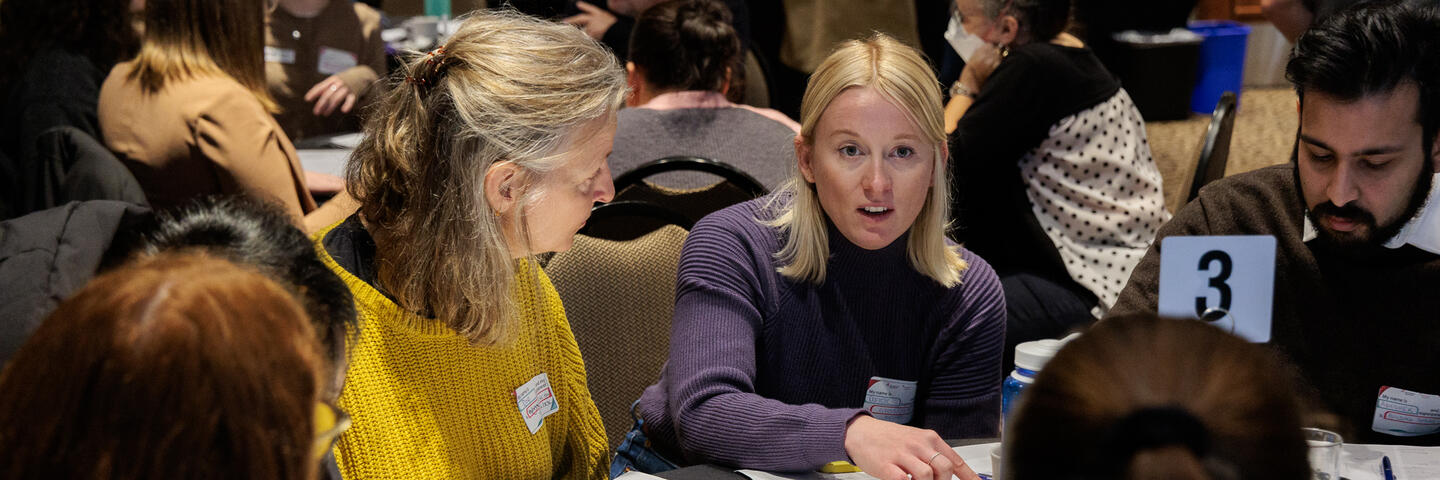
The fourth annual Skunkworks, Hacking Chronic Disease, brought together interdisciplinary teams of allied health and industry professionals, students, and patient partners to collaborate on innovative solutions to address the complex challenges surrounding chronic disease treatment and prevention.
Hosted by Providence Research and Providence Health, Research and Engagement (PHIR+E) in partnership with St. Paul’s Foundation, Skunkworks is a unique event series that aims to facilitate innovation to address complex local health problems that resonate globally. The term "skunkworks" originated in the 1940s as an alias for an American engineering lab that worked on top-secret and innovative programs at Lockheed Aircraft Corporation, and now refers to a project developed by a loosely structured group of people who identify issues and pilot creative solutions.
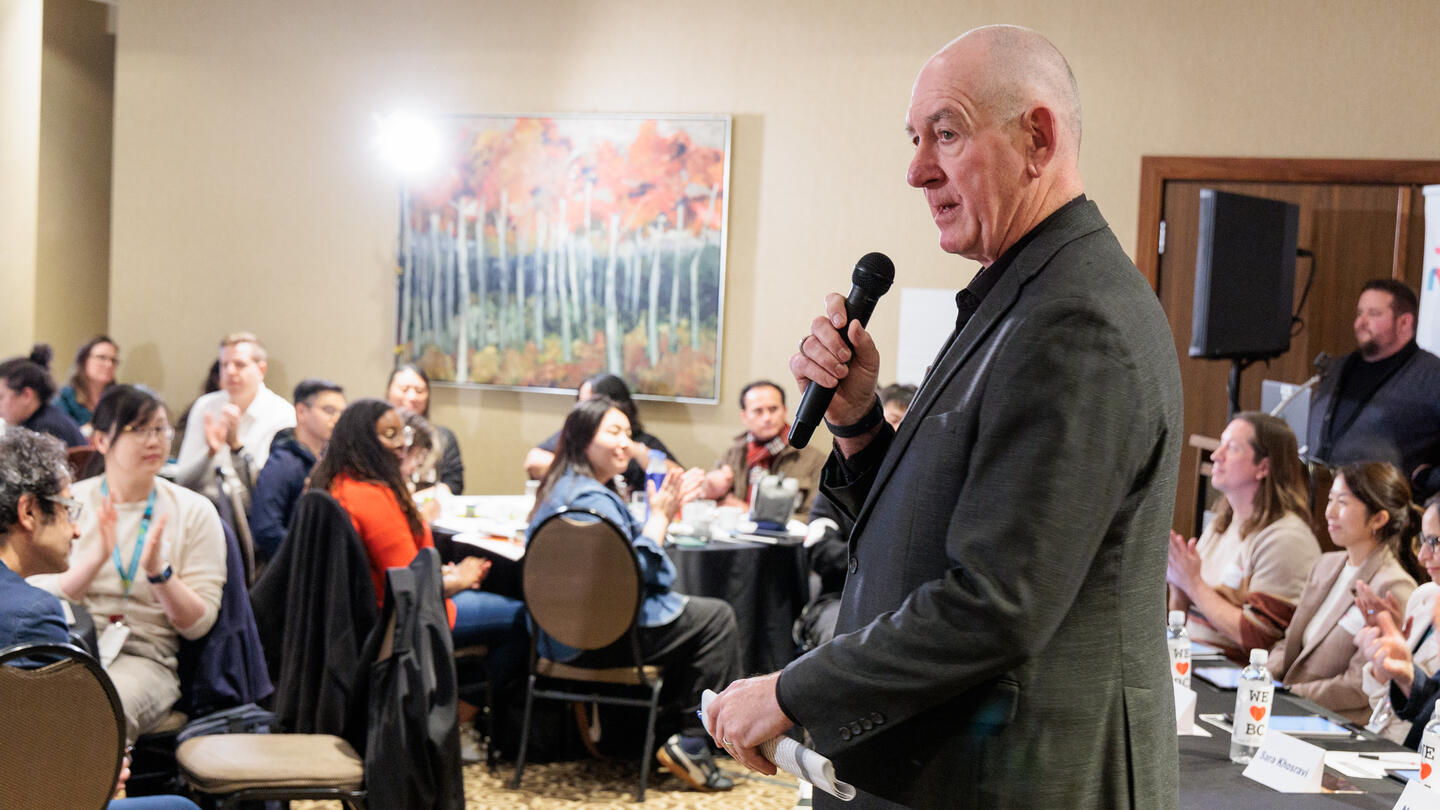
Dr. Darryl Knight, President, Providence Research, speaks at Skunkworks: Hacking Chronic Disease
“Skunkworks was an amazing experience to have with my colleagues. It made us think differently, and to explore out-of-the-box solutions. It was also wonderful to meet and work with new people, including passionate patient partners,” says Courtney Symes, a Nurse Educator at Providence Health Care (PHC) who participated in Skunkworks: Hacking Chronic Disease.
Previous Skunkworks have ‘hacked’ the topics of pain, wounds, and aging, producing pilot projects such as the Mend & Tend drop-in wound clinic, and Oasis Connect, an app to enhance care delivery and family engagement within Canadian long-term care homes.
Speakers provide context on major global health challenge
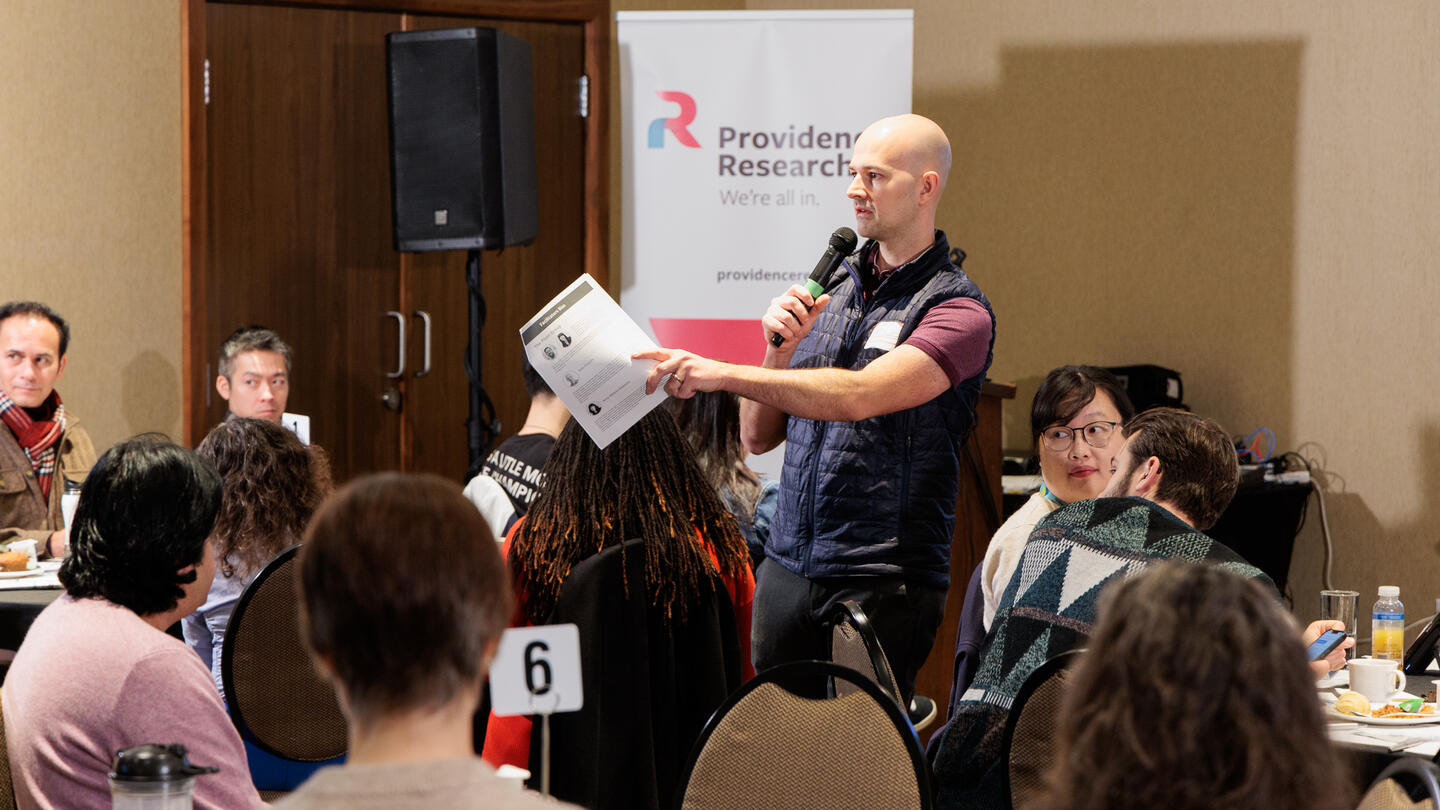
Pivot Group facilitator Rob Paquin speaks at Skunkworks: Hacking Chronic Disease.
The treatment and prevention of chronic disease presents a major global health challenge. According to Health Canada’s latest report, Health of Canadians, forty-five per cent of Canadians live with at least one major chronic disease. The prevalence of chronic disease increases with age, so as the population ages, so will rates of chronic disease. To provide greater context to this issue, speakers at Skunkworks: Hacking Chronic Disease gave insightful talks highlighting the need for innovative, effective solutions to reimagine chronic disease treatment and prevention.
Dr. Kate Smolina, Scientific Director, Data & Analytics Services and Knowledge Translation, BC Centre for Disease Control, spoke about why managing chronic disease matters. Chronic disease has significant costs to the health system and to patients, so it is important to invest in both treatment and prevention strategies.
Patient advocate Claire Snyman shared her experience as a person living with multiple chronic diseases – asthma, endometriosis, and a brain tumour. Managing chronic diseases can feel like a full-time job, and Snyman emphasized that there are many opportunities to improve the health system to better cater to the needs of patients.
Dr. Muhammad Mamdani, Vice President of Data Science and Advanced Analytics, Unity Health Toronto spoke about AI use in chronic disease treatment and prevention. AI has incredible potential to improve health care, such as AI scribes that free up time for physicians to focus on patients. However, AI also has the potential to cause harm, and issues including ethics and clinical validation need to be taken into account when considering the use of AI in the treatment of chronic disease.
Innovation strategist Lucien Engelen, who is based in the Netherlands, spoke about determinants of health and the importance of preventing illness and advancing personalized medicine. He emphasized that more health care is not the solution to current challenges – more health is. Investment in health translates into economic growth through improved productivity, reduced healthcare cost, and other factors.
“This meeting of minds, from medical care service providers, patient engagement partners, policy makers, and supporters from the business industry through their funding, was a great opportunity to solicit ideas on the use of digital technology to improve on how medical care is delivered to people with chronic illnesses,” says Mario Gregorio, a patient partner and member of the University of British Columbia’s Innovation in Dementia and Aging (IDEA) Lab. Gregorio also participated in Skunkworks: Hacking Aging in 2023.
Creating solutions with design thinking

Participant Tinotenda Masvikeni works on a design-thinking activity.
Skunkworks is framed around design-thinking, an approach to problem solving anchored in human-centred design. Participants ‘voted with their feet’ to choose their teams based on which challenge surrounding chronic disease they wanted to ‘hack.’ Participants brought their expertise from across the health sector, including acute, outpatient, and long-term care, and other fields such as data analytics, to develop solutions for these challenges.
“Skunkworks was an incredible opportunity to connect and collaborate with colleagues and patient partners I might never have crossed paths with otherwise. The dynamic environment allowed everyone to bring their unique viewpoints and ideas to the table, broadening my perspective,” says PHC Occupational Therapist Sarah England.
Facilitators Marlies van Dijk, Josh McCutcheon, and Rob Paquin from The Pivot Group led participants through a variety of design-thinking activities to help them brainstorm and ideate on their solutions, such as using analogies to think differently about their challenges and rapidly sketching solutions in one-minute intervals. Based on this work and their learnings from the lightning talks, the teams developed storyboards to present their pitches to a panel of judges.
Four teams receive awards for their innovative solutions
This year’s Skunkworks judges were Jaimie Borisoff, Director, BCIT MAKE+, Jason Elliott, MDM and pre-MDM faculty member, Centre for Digital Media, Liz Flores, Executive Director, Quality, Patient Safety and Accreditation, PHC, Amanda Tong, Investment Associate, InBC Investment Corp, Sara Khosravi, Senior Manager, Technology Commercialization, SFU Technology Licensing Office, Jonathan Jafari, Entrepreneur in Residence, entrepreneurship@UBC, and Norm Peters, Chief Operating Officer, PHC.
The Digital Trailblazer Award was given to the idea involving the best use or adaptation of technology that will directly impact chronic disease. In Skunkworks’ first tie, this award was given to Team #2, the Electronic Health Team, and Team #11, the COPD Flare-Up Plan.
The Electronic Health Team proposed an AI interface, integrated into health databases, that would provide more detail and context on health data results while providing suggestions to patients on ways to improve their health.
For chronic conditions like COPD, it is helpful to have an action plan for a flare- up, but existing ones can be complicated, time consuming and generic. The COPD Flare-Up Plan team pitched an AI program that would assist physicians in creating personalized, patient-centred action plans.
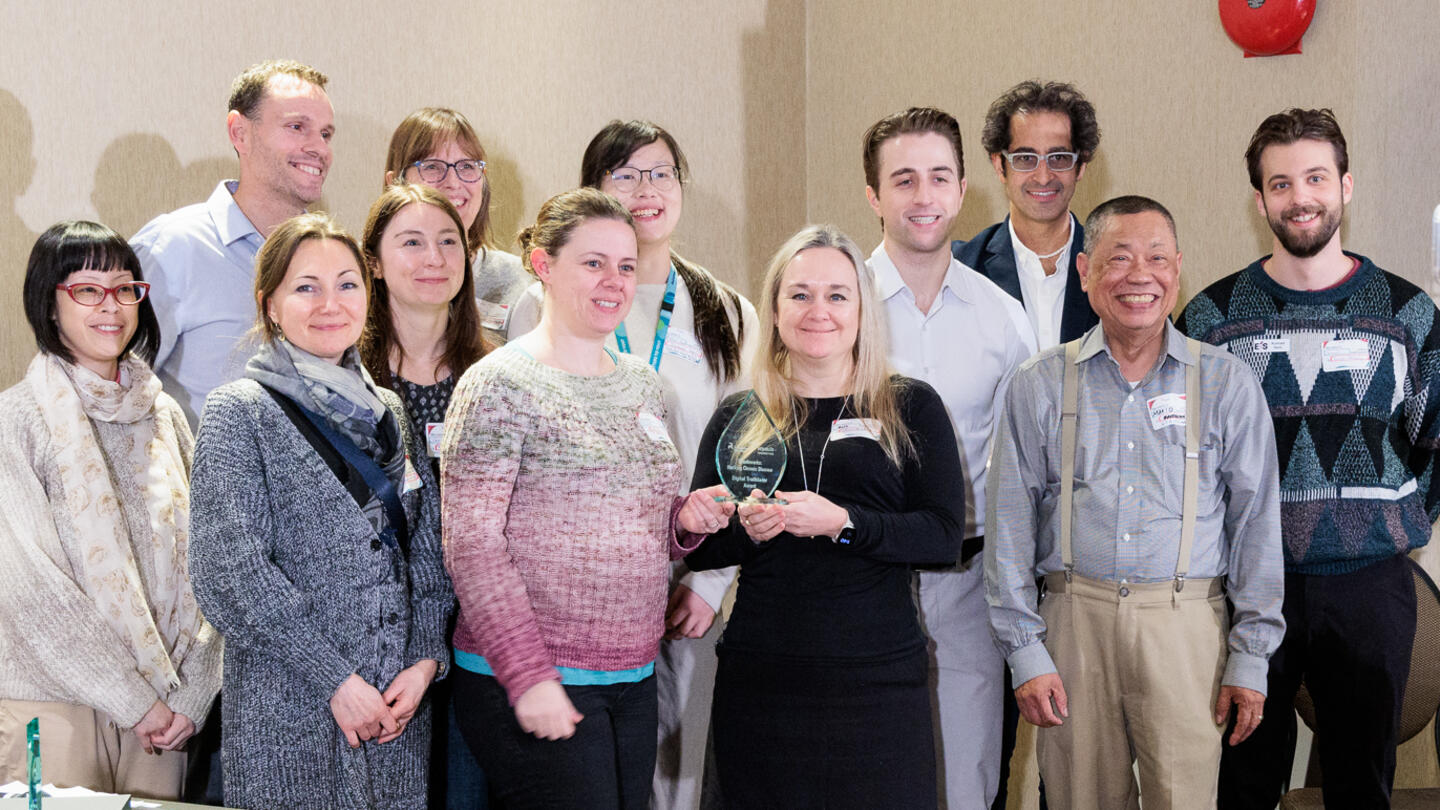
Team #2 and Team #11 receive Digital Trailblazer Award. L-R: Melissa Pang, Jonathan Dick, Olena Sklara, Lori Kamlah, Sarah England, Rachel Carter, Binhui Luo, Beth Snow, Charles Keenan, Gil Kimel, Mario Gregorio, Konrad Swic.
The Health Disruptor Award was given to the idea that seeks to advance research and yield new knowledge with ideas that could result in products, services or practices that will positively impact chronic disease. This was given to Team #6, Stairway to Health.
In treating chronic disease, prevention is often more impactful than cure. This team proposed a program that would incentivize taking the stairs at PHC sites, while improving the experience by adding art, educational components, and color themes to stairwells.
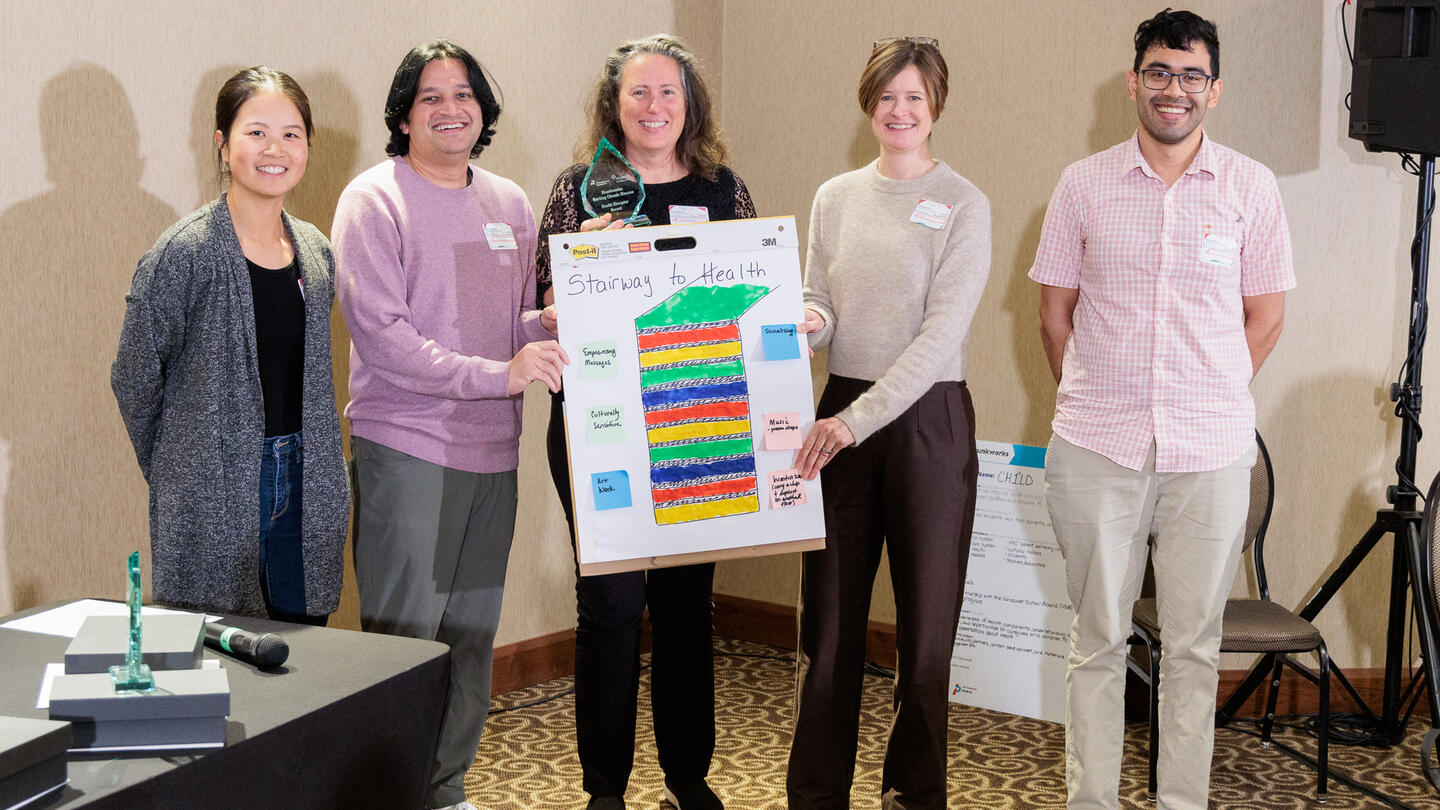
Team #6 receives the Health Disruptor Award. L-R: Daisy Lin, Abdul Cheema, Lisa Maks, Karen Sims, Vignesh Murthy.
The Patient Safety Technology Award is given to a technology-based solution to the areas of medication-related errors, medical complications with patient care, procedure or surgery-related errors, infections, or diagnostic errors. This award was funded by the Pittsburgh Regional Health Initiative through their Patient Safety Technology Challenge, and was given to Team #9, Health in your Hands.
This AI program would help patients understand complex lab results by providing patient-focused lab reports in plain language, empowering patients to take control and make informed decisions about their care.
“I really enjoyed the opportunity, as a patient, to work collaboratively with health professionals. I felt both seen and valued in the process, seeing so many passionate people wanting to improve the lives of patients,” says Carly Pistawka, patient partner and Health in Your Hands team member. “By the end, we were so excited about our project, and I am looking forward to being involved in the next steps for our idea.”
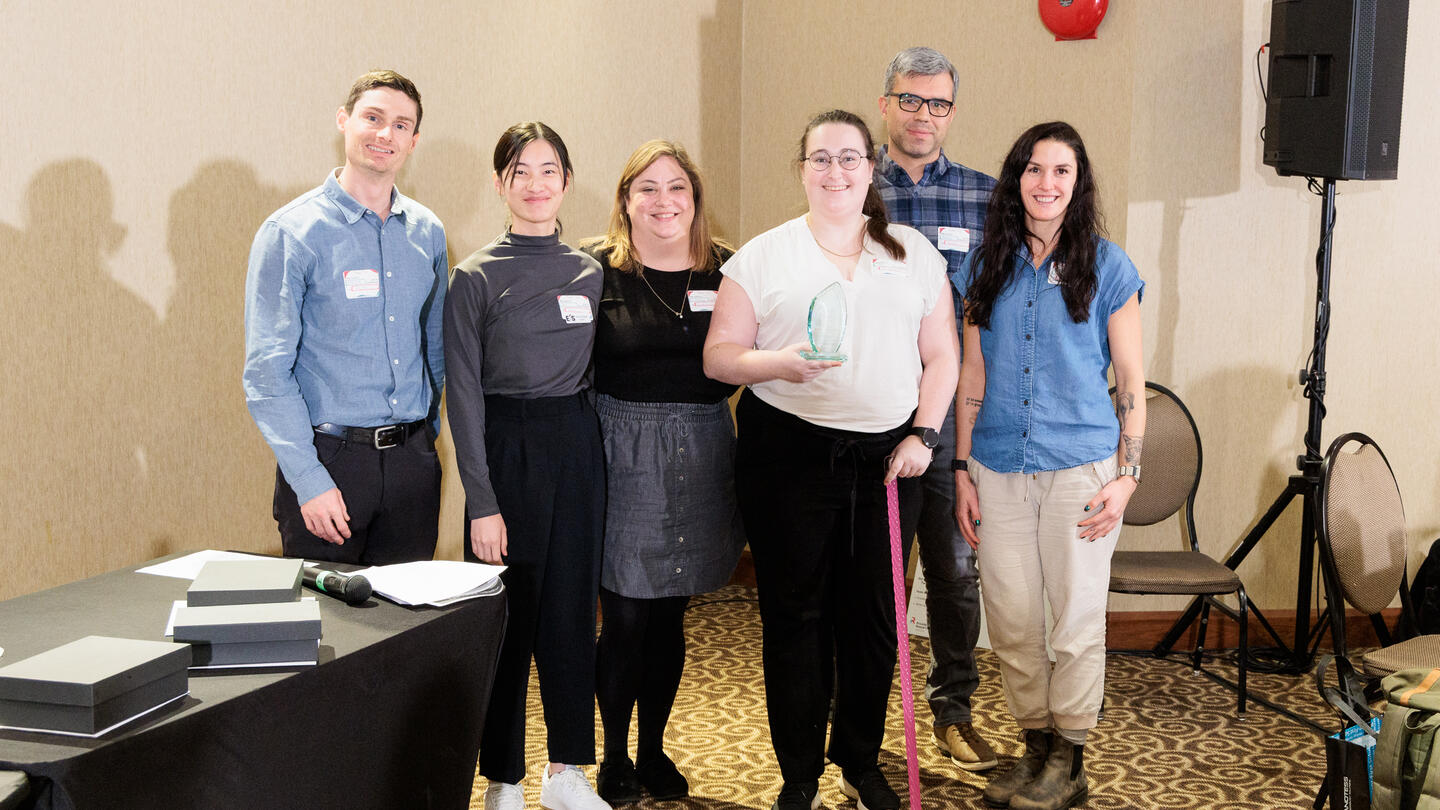
Team #9 receives the Patient Safety Technology Award. L-R: Mark Elliott, Izzy Yixin Zhang, Courtney Symes, Carly Pistawka, Rodrigo Gomes Batista, Serena Eagland.
Providence Health Care has a long history of creating innovative solutions to complex health care problems. These solutions created at Skunkworks: Hacking Chronic Disease will help continue this legacy.
We want to extend a big thank you to the sponsors who made this event possible, and to our patient partners and mentors, who enriched the event with their experience and expertise.